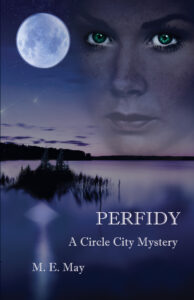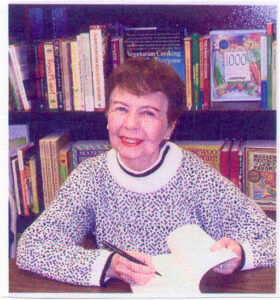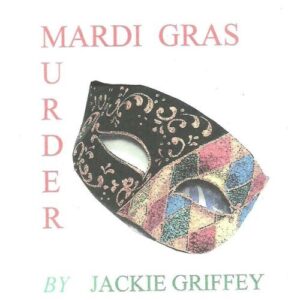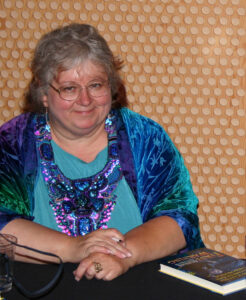Today I’d like to introduce new author, M.E. May. I had the pleasure of editing her novel, Perfidy, published by True Grit Publishing, an imprint of Weaving Dreams Publishing, and I’m so excited to have her join us today! Please help me in welcoming M.E. May to The Editing Essentials.

M. E. May was born in Indianapolis, Indiana, and now lives near Chicago with her husband, Paul, and Husky, Iris. Her two children and four wonderful grandsons all live in central Indiana. She studied Social and Behavioral Sciences at Indiana University, where she learned about human nature and social influence on behavior as well as finding her talent for writing. Her first novel, Perfidy, is a crime thriller in which a young woman’s desperate search for her missing mother reveals long held secrets and lies that will change her life forever. This the first book in M. E. May’s Circle City Mystery Series. To learn more, visit her website at: http://www.memay-mysteries.com
WD: Did you choose the genre, or did the genre choose you?
MEM: That’s an interesting question. I would say the latter. For many years, I told myself I had a book in me. At one point, I contemplated writing a comical piece about the dating world. Anyone who’s been out there knows what I mean.
One of my favorite genres is fantasy, but I believe it takes a special person to create a new world like in JRR Tolkein’s The Hobbit, and Lord of the Rings.
The mystery genre chose me, because this is where my talents flourish. My interests in psychology, sociology, and criminal justice prevail. It’s been an interesting journey from reading and trying to solve a mystery to creating the clues that lead readers to a solution. Through this process, I’ve learned a great deal about police procedure, forensics, private investigation, and much more that I may not have taken the time to research had I not been creating these novels.

WD: What was your inspiration for Perfidy? A person, place, an event? How did you get started?
MEM: In 2008, my husband and I agreed I should leave my full-time job and take a year to get started on writing. I will admit, it took several months for me to really sink my teeth into it once I had the premise for Perfidy.
In 2007, Lisa Stebic and Stacy Peterson disappeared without a trace. These types of cases don’t generally stay in the news very long, but Stacy’s husband was quite verbal. As a police officer, he apparently didn’t feel a need for discretion. He continually proclaimed his innocence and claimed that Stacy took off with another man.
The situation of a police officer’s wife going missing was the spark which brought the idea behind Perfidy alive. Of course, my imagination took over and my story doesn’t end the way many feel Lisa and Stacy’s story end.
I used Indianapolis as my setting because it’s my hometown and I know it well. The police department there has been great about answering any questions regarding police procedure. The Indianapolis governmental website, www.indy.gov, carries a lot of good information about how the city governmental offices are structured and provide good contact information.
I try to keep it real. I want an Indianapolis police officer to read Perfidy and be able to tell others, “That M. E. May really knows her stuff.”
WD: I understand Perfidy is the first novel in a series. Are you afraid the series will become dull or difficult to write after a while?
MEM: When I designed this series, I decided to create it so that there was a different protagonist in each subsequent book. You will see many of the predominate characters in each book, but the focus will be on someone different.
For example, Perfidy centers around Mandy Stevenson. She is the daughter of Captain Robert Stevenson, the Commander of the Homicide and Robbery Division. In Perfidy, you will meet several police officers from Homicide and from the Missing Persons Unit. One of the homicide detectives, Erica Barnes, will be the protagonist in book two of the Circle City Mystery Series, entitled Inconspicuous (to be released in September 2013).
WD: If you could be any of the characters in your novel, who would you be?
MEM: The protagonist, Mandy Stevens. She is a mixture of my personality traits and beliefs. However, she also has a strength I wished I had possessed at her age. Although a bit naïve as are most twenty-two year olds, she has a confidence and determination I admire.
WD: Is it more difficult for you to write: good characters or bad characters? And why?
MEM: “Good” characters are harder for me. Although they are the “good guys,” they are human and cannot be perfect or they will not be realistic. They must have flaws. As a reader, I like characters with depth. In order for me to relate or to decide how I feel about a character, I must have those elements which irritate me about them as well as those that endear them to me.
The “bad guy” is much easier. No one is supposed to like him/her. It also gives me the opportunity to look at the world through a different type of mind. That’s not to say the reader won’t feel some sympathy for the antagonist, depending upon what has led him/her to commit the crime. Someone who is having a psychotic break with reality would gain more sympathy than a sociopath who has no regret for what he/she has done.
WD: How do you feel about writing short stories?
MEM: When I started this venture, I entered several flash fiction contests. Many of those only allowed 500 words, some less. I found that very difficult. I believe I am just one of those people who cannot tell a story without going into a lot of detail.
Then I joined the Speed City Chapter of Sisters in Crime. They asked if I would write a short story for their upcoming anthology called Hoosier Hoops and Hijinx. I was hesitant at first as I lacked confidence in my ability to produce an adequate story in short form. However, they allowed me 7,500 words and somehow the story just flowed. They have accepted my story, “Uncle Vito and the Cheerleader” and the anthology will be released in October 2013. This may have been the boost I needed to give short stories another shot.
WD: Have you thought about crossing genres, or writing a stand alone?
MEM: I think a stand-alone is a possibility, but I don’t have anything in mind at the moment. I’ve thought about another series about a private investigator, but that’s still in the planning stages. Crossing genres—at this point, I don’t see it happening. As I said earlier, my interests lie in areas that mesh with the mystery genre. I believe writing these stories is my destiny.
Thank you so much for sharing with us today! If you have questions for M.E., feel free to post comments for her. She’ll be with us all day. Thank you!
 Writers, take this time to reflect on the year, your goals, and how much you accomplished. How did you fare? Is it time to raise your writing goal to 3000 words or more a day?
Writers, take this time to reflect on the year, your goals, and how much you accomplished. How did you fare? Is it time to raise your writing goal to 3000 words or more a day?








